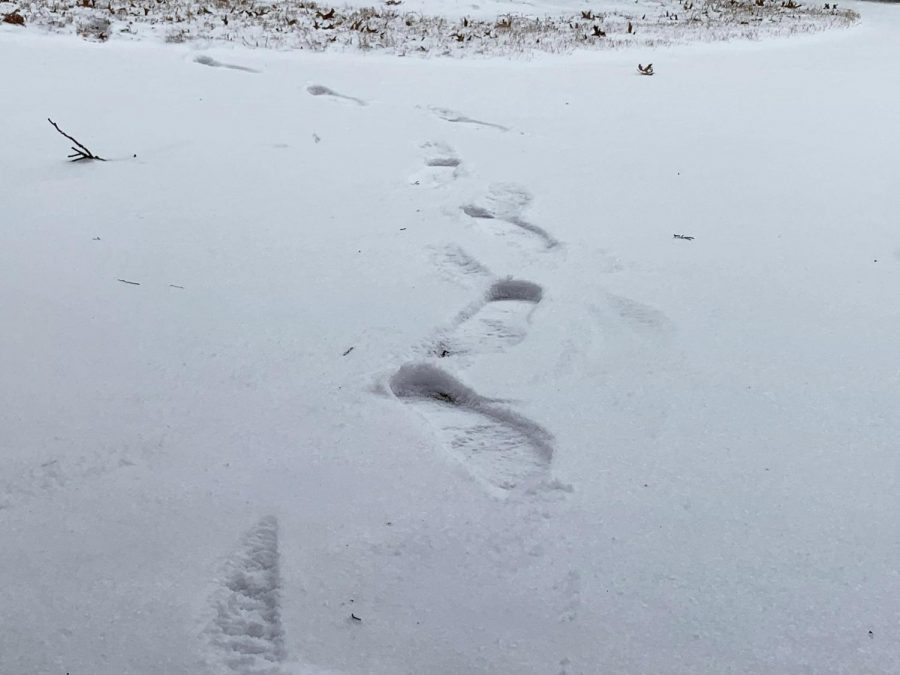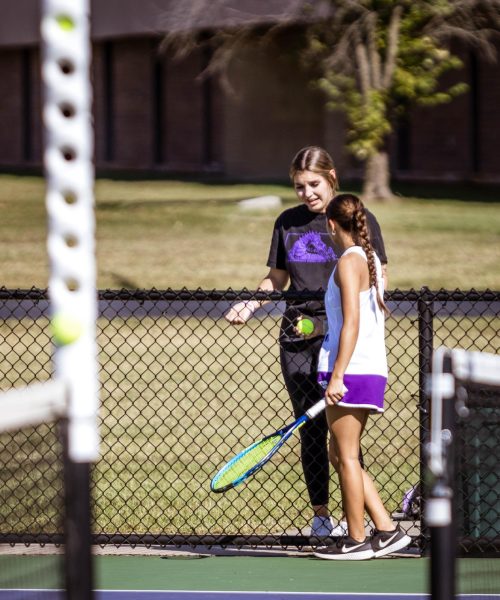The process behind canceling
Superintendent, maintenance director discuss reasoning behind school cancelation due to winter weather
Photo by: Nicole Konopelko
Tomorrow is already setting itself up to be another cold day.
The National Weather Service (NWS) projects a high of 24°F, a wind chill value as low as five and a possible snow accumulation of 1-2 inches, creating hopes for a snow day.
But what factors into the decision to cancel school?
The decision won’t be made by a certified meteorologist or specialist — it’ll be made by Richard Proffitt, the superintendent of the USD 250 school district.
Any time there’s a weather event that could prompt school cancelation, Proffitt wakes up at 4 a.m. and drives around Pittsburg, taking a route that guides him around the entire school district.
He looks closely at sidewalks and roads to make a decision. He also calls the NWS and area superintendents to seek their input.
“I have over 3,000 students, 540 employees, along with the entire community that are looking for me in leadership to make the appropriate decision,” Proffitt said. “That’s not taken lightly.”
The school district doesn’t have a written policy in place for weather cancelation. According to Proffitt, weather cancelation is difficult to condense into one policy because every weather event entails something different. Thus, the decision entirely falls on the superintendent.
Waking up at 4 a.m. is not a part of Proffitt’s job description, but he looks at it as if it is.
“I could delegate that to the maintenance director and transportation director, but since it is the superintendent’s call, I have to take my due diligence when that decision is made. I have to be a part of the process,” Proffitt said. “It all comes back to me, so I’ll take the lead. I don’t ask anyone to get up at 4 a.m.; I get up at 4 a.m.”
Proffitt takes a multitude of factors into consideration, but the biggest red flag for him is ice.
“There’s more of a danger with the factor of ice falling or the risk of electricity being out because of ice,” Proffitt said. “There are also times where we’re all ready for school and then a tree limb falls, the power lines go out and everybody is out of electricity at school and at home. You’re only going to stay warm for a limited amount of time, so ice is the one that you really have to watch out for.”
Proffitt has canceled school twice this year due to inclement weather; once on Feb. 7 and once on Feb. 15.
This is Proffitt’s first year being the superintendent for USD 250. In previous years, he was the superintendent at Southeast of Saline and Chanute Public Schools.
One time, when Proffitt worked at Southeast of Saline, he woke up at 4 a.m., as usual, to observe the roads. This time, however, a driver’s car was stuck in a nearby ditch and Proffitt stepped out of his vehicle to help the driver push the car out.
From that moment, Proffitt knew he had to cancel school.
“I’m not saying I want people to have accidents so that I can make my decision, but being out and seeing somebody come up to a stoplight and see where there is slick ice [helps],” Proffitt said. “I ask myself, ‘Are the sidewalks okay? Are the gravel roads a lot more slick than the other roads? What happens about those kids that are on gravel roads?’”
Proffitt knows that his decision — regardless of whether it is to cancel or not to cancel — will come with mixed reactions.
“As a superintendent, I hate snow days because I can’t win,” Proffitt said. “If you call school off, 50 percent of people will call me a hero and then the other 50 percent thinks, ‘Well I don’t know what he’s doing…’ It’s a no-win situation. It’s a decision that involves a whole lot of people, and when it comes down to it, it rests on my shoulders.”
Proffitt also includes assistant superintendent Dr. Brad Hanson, transportation director Vince Johnston and maintenance director Jim Newell.
As maintenance director, Newell is responsible for maintaining the safety of the roads around the district. With his maintenance staff of six people, including himself, Newell clears the roads in the district before school is in session.
“We start no later than 4:30 a.m. and typically we won’t blaze unless we have two inches of snow,” Newell said. “If it’s less than two inches, then it’s a waste of time. The rest of the guys will come in at roughly 5 a.m. and what we have already cleaned, they will go out and spread ice melt on. Two of those people will use our mowers and blaze the streets with them. Two other people will go onto the sidewalks and clear them. Basically, the rest of the crew will just spread ice melt, because it doesn’t always get fully cleaned.”
However, according to Newell, when the snowfall accumulation exceeds seven inches, the blades won’t hold up, becoming obvious that school should be canceled. Oftentimes, ice is the determining factor.
“Typically if the temperature is around 32 to 35 or so, ice melt works really well,” Newell said. “But if it’s bitter cold and there is no sun once it’s time for the sun to come up, it’s effective, but not nearly as quick as it should be.”
Newell, who’s been maintenance director for 26 years, knows there is always room for error.
“I’ll tell you what it really is, is that we make a decision based on what a meteorologist’s forecast says,” Newell said. “And honestly, we’ve looked kind of stupid a couple of times, but it is what it is. You just kind of got to look at the forecast and if there’s eight to 10 inches of snow and it’s going to be falling all day, I mean to me, it’s kind of a wise decision to go ahead and call it.”
Depending on the weather, Proffitt may be back on the roads on Tuesday morning, repeating the same process and determining whether or not to call off school for the third time this year.
Your donation will support the student journalists of Pittsburg High School - KS. Your contribution will allow us to purchase equipment and cover our annual website hosting costs.










